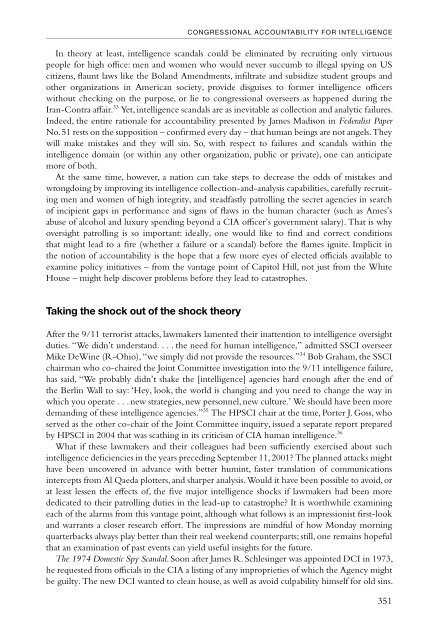Handbook of intelligence studies / edited by
Handbook of intelligence studies / edited by
Handbook of intelligence studies / edited by
You also want an ePaper? Increase the reach of your titles
YUMPU automatically turns print PDFs into web optimized ePapers that Google loves.
In theory at least, <strong>intelligence</strong> scandals could be eliminated <strong>by</strong> recruiting only virtuous<br />
people for high <strong>of</strong>fice: men and women who would never succumb to illegal spying on US<br />
citizens, flaunt laws like the Boland Amendments, infiltrate and subsidize student groups and<br />
other organizations in American society, provide disguises to former <strong>intelligence</strong> <strong>of</strong>ficers<br />
without checking on the purpose, or lie to congressional overseers as happened during the<br />
Iran-Contra affair. 33 Yet, <strong>intelligence</strong> scandals are as inevitable as collection and analytic failures.<br />
Indeed, the entire rationale for accountability presented <strong>by</strong> James Madison in Federalist Paper<br />
No. 51 rests on the supposition – confirmed every day – that human beings are not angels. They<br />
will make mistakes and they will sin. So, with respect to failures and scandals within the<br />
<strong>intelligence</strong> domain (or within any other organization, public or private), one can anticipate<br />
more <strong>of</strong> both.<br />
At the same time, however, a nation can take steps to decrease the odds <strong>of</strong> mistakes and<br />
wrongdoing <strong>by</strong> improving its <strong>intelligence</strong> collection-and-analysis capabilities, carefully recruiting<br />
men and women <strong>of</strong> high integrity, and steadfastly patrolling the secret agencies in search<br />
<strong>of</strong> incipient gaps in performance and signs <strong>of</strong> flaws in the human character (such as Ames’s<br />
abuse <strong>of</strong> alcohol and luxury spending beyond a CIA <strong>of</strong>ficer’s government salary). That is why<br />
oversight patrolling is so important: ideally, one would like to find and correct conditions<br />
that might lead to a fire (whether a failure or a scandal) before the flames ignite. Implicit in<br />
the notion <strong>of</strong> accountability is the hope that a few more eyes <strong>of</strong> elected <strong>of</strong>ficials available to<br />
examine policy initiatives – from the vantage point <strong>of</strong> Capitol Hill, not just from the White<br />
House – might help discover problems before they lead to catastrophes.<br />
Taking the shock out <strong>of</strong> the shock theory<br />
CONGRESSIONAL ACCOUNTABILITY FOR INTELLIGENCE<br />
After the 9/11 terrorist attacks, lawmakers lamented their inattention to <strong>intelligence</strong> oversight<br />
duties. “We didn’t understand. ... the need for human <strong>intelligence</strong>,” admitted SSCI overseer<br />
Mike DeWine (R-Ohio), “we simply did not provide the resources.” 34 Bob Graham, the SSCI<br />
chairman who co-chaired the Joint Committee investigation into the 9/11 <strong>intelligence</strong> failure,<br />
has said, “We probably didn’t shake the [<strong>intelligence</strong>] agencies hard enough after the end <strong>of</strong><br />
the Berlin Wall to say: ‘Hey, look, the world is changing and you need to change the way in<br />
which you operate . . . new strategies, new personnel, new culture.’ We should have been more<br />
demanding <strong>of</strong> these <strong>intelligence</strong> agencies.” 35 The HPSCI chair at the time, Porter J. Goss, who<br />
served as the other co-chair <strong>of</strong> the Joint Committee inquiry, issued a separate report prepared<br />
<strong>by</strong> HPSCI in 2004 that was scathing in its criticism <strong>of</strong> CIA human <strong>intelligence</strong>. 36<br />
What if these lawmakers and their colleagues had been sufficiently exercised about such<br />
<strong>intelligence</strong> deficiencies in the years preceding September 11, 2001? The planned attacks might<br />
have been uncovered in advance with better humint, faster translation <strong>of</strong> communications<br />
intercepts from Al Qaeda plotters, and sharper analysis. Would it have been possible to avoid, or<br />
at least lessen the effects <strong>of</strong>, the five major <strong>intelligence</strong> shocks if lawmakers had been more<br />
dedicated to their patrolling duties in the lead-up to catastrophe? It is worthwhile examining<br />
each <strong>of</strong> the alarms from this vantage point, although what follows is an impressionist first-look<br />
and warrants a closer research effort. The impressions are mindful <strong>of</strong> how Monday morning<br />
quarterbacks always play better than their real weekend counterparts; still, one remains hopeful<br />
that an examination <strong>of</strong> past events can yield useful insights for the future.<br />
The 1974 Domestic Spy Scandal. Soon after James R. Schlesinger was appointed DCI in 1973,<br />
he requested from <strong>of</strong>ficials in the CIA a listing <strong>of</strong> any improprieties <strong>of</strong> which the Agency might<br />
be guilty. The new DCI wanted to clean house, as well as avoid culpability himself for old sins.<br />
351
















